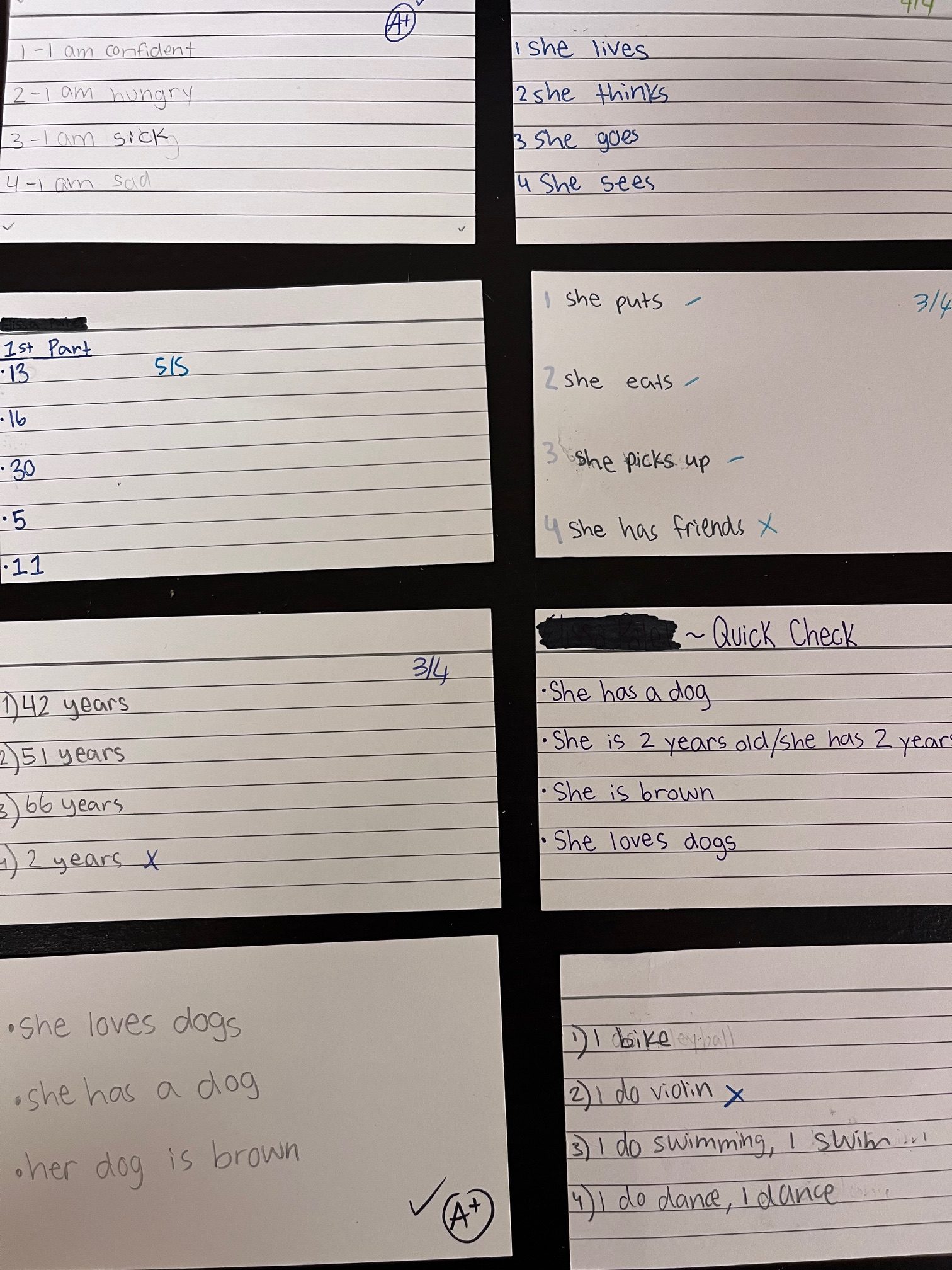This is the sixth installment in a series of posts on Assessments in the Communicative and Comprehension based classroom.
This past year our entire Middle School and High School faculty read Neuroteach by Glenn Whitman and Ian Kelleher. We then split into PLCs, focusing on a particular chapter of the book. I chose Assessments because I wanted to experiment with frequent low-stakes assessments in my Novice 7th grade class that could support active retrieval of content and provide quick and efficient feedback to my students before the more summative or higher-stakes assessments. Here are my learnings:
What I implemented
At some point during our study of a “topic” (comparing French & American schools) or a “skill” (understanding what time it is), I provide my students with a notecard at the beginning of class with one of the following prompts:
- Translate 4-5 phrases/sentences into English (listen or read)
- Read 4-5 statements and decide if they are true or false, then correct the false ones
- Write 4-5 phrases/sentences in French
The whole thing takes less than 5 minutes.
You can see below the evolution of the quick checks from input-driven (emotions, High Frequency verbs, numbers, Special Person, physical descriptions, T/F statements from a book or a cultural topic) to more output-driven (Write New Year’s resolutions and physical descriptions in the Target Language).


What I learned
- At first I did not announce the quick checks and some of my students resented that. So, I shifted to announcing them like any other assignment.
- I can provide feedback to students faster because these are so quick to grade.
- I am more successful at convincing students to stop by for more repetition once I have this evidence in hand.
- I have only had to organize one retake after a formal assessment this year. The quick checks have pushed my students to be more proactive in how they prepare for assessments. Instead of studying at the last minute, they get a chance to start reviewing content on their own sooner. These tiny assessments are “prime-learning and long-term memory consolidation opportunities” (Neuroteach, p. 97)
- There is some accountability because I grade the quick checks, but the grade is so small, it does not impact their overall grade.
- Students gain a much better understanding of where they are in their learning process and where they might need more focus/study/repetition before a more formal assessment. In a proficiency-based classroom, where we are not learning using drills and vocab lists, students sometimes do not know what they are actually acquiring. Doing these quick checks has made the learning more visible to them.
- Last but not least, quick checks reduce student anxiety! When I first implemented the practice, students felt a little anxious but once they realized what low-stake assessment actually meant, it helped them feel more confident.
Feedback from students
Students evaluate our courses every semester. Last semester, nearly a third of my students spontaneously chose to comment specifically on quick checks. This was unprompted by me as they can comment on any aspect of the class. Here are some excerpts:
“I would never change the way we do quick checks periodically because it helps me understand what I need to work on and how I can better prepare for the test or quiz coming up. “
“I don’t necessarily like the quick checks but I think they help me learn better and remember things better.”
“I really enjoy this class, because Madame Laine makes it fun and provides lots of help and quick checks that help me to learn.
“Something I love about French class is the homework. The fact that it is un-graded and helps me feel less pressure. It also makes it just practice which is how I think all homework should be. Another thing I would not change are the quick checks. Though they are a grade they really help me see where I am in the unit and what I need to practice. When they are only four questions it helps me feel less worried.”
“Something I would never change about this class is that we have homework to practice what we learned and then a quick check for even more practice.”
A note on language accuracy
I also experimented with providing explicit grammar/accuracy feedback during the second semester on the quick check (see the two notecards with blue writing). I *think* the timing was right for this explicit feedback. However, I want to make clear that this is not how I typically assess writing my class. This is how I typically assess writing.
Conclusion
Implementing frequent low-stakes assessments in my 7th-grade French class has definitely improved my practice this year. Student feedback speaks volumes about the benefits: increased understanding, reduced anxiety, and clearer learning pathways. As I continue to navigate the intersection between Second Language Acquisition (SLA) principles and Mind Brain Education (MBE) principles, I look forward to further growth for me and my students.
Read more about assessments in the communicative and comprehension-based classroom here.



Leave a Reply